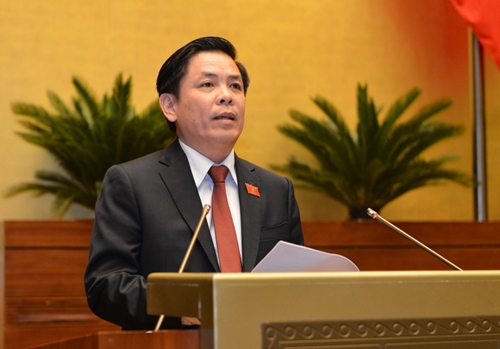Minister of Transport Nguyen Van The, on behalf of the Prime Minister, made the statement on October 24 as he presented the report on the feasibility study for the airport’s first phase. The study will be reviewed by the National Assembly (NA) during the ongoing 8th session of the 14th tenure held in Hanoi.
The planned airport, situated near its namesake township in the southern province of Dong Nai, is a national key project and expected to become a major international aviation hub in the region when it becomes operational, The said.
The first phase of the project costs an estimated 111.689 trillion VND or about 4.779 billion USD, a little lower than the previously NA-approved figure of 4.782 billion USD, with ground clearance costs not yet accounted for.
    |
 |
|
Minister of Transport Nguyen Van The |
According to the report, the project is made up of three investment phases with the ultimate goal of making the airport capable of serving 100 million passengers and handling 5 million tonnes of goods a year.
In the first phase of the project, one runway and one terminal will be built, together with other components.
Vu Hong Thanh, Chairman of the NA’s Economic Committee, which was charged with assessing the Government’s report, said that many NA deputies want the Government to add another runway to the first phase of the project, to make sure that if any incident were to occur, traffic at the airport's operation would not be disrupted.
However, the committee still gave the nod to the Government’s plan on the first phase but asked that the Government quickly formulate the second and third phases of the projects.
The Government has also requested the NA to approve its plan to assign the State-owned Airports Corporation of Vietnam (ACV) JSC as the main investor for Long Thanh International Airport right away, instead of going through open bidding as stipulated in the Law on Investment.
“Carrying open bidding and weighing which investors to choose will certainly cost us another 1.5-2 years, while truth be told, there couldn’t possibly be any company other than ACV who has the experience, the capacity, and can satisfy the demands for the insurance of national security in a highly important project like Long Thanh International Airport,” The told the parliament.
According to the Government’s plan, ACV will be the investor and operator of the airport, who will use its own capital to invest into the construction of the State management administrative building and essential component buildings of the airport.
ACV can make use of concession contracts to partner up with private businesses to carry out service components of the airport.
For construction components that are meant for air navigation management, the Government plans to assign the State-owned Vietnam Air Traffic Management Corporation (VATM) to be the investor since this is the only company that is allowed to provide air navigation management services.
ACV expects to contribute about 1.566 billion USD in capital in the 2019-25 period, or 37 percent of the total investment for the first phase of the airport project, with the remaining 2.628 billion USD coming from loans.
So far, ACV has worked with 12 foreign and domestic credit organisations and signed memorandums of understanding (MoU) to secure loans of 5 billion USD, with the borrowing term set for 15 years, a grace period of 5 years and an annual interest of 5-5.5 percent.
Source: VNA